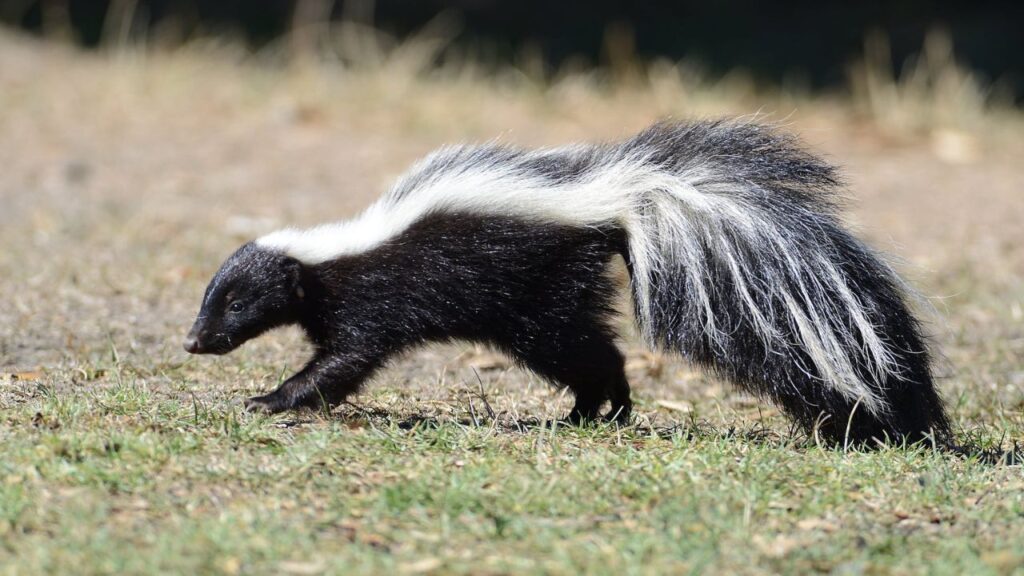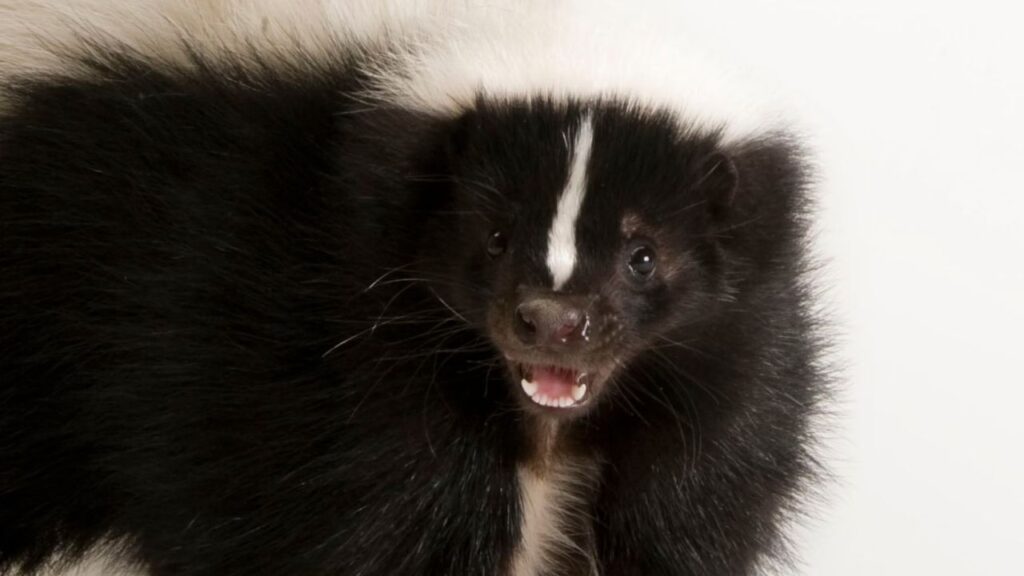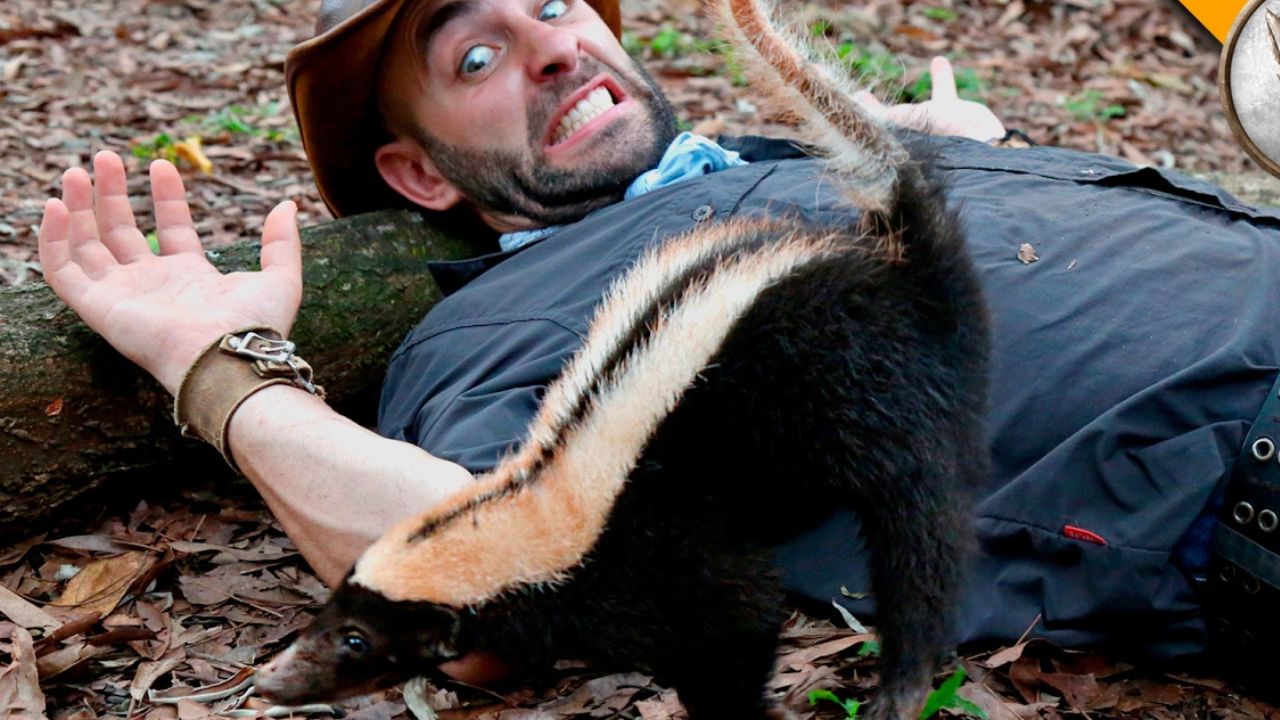Do Skunks Attack Humans? Skunks rarely attack humans and usually spray a foul-smelling liquid as a defense mechanism when they feel threatened.
Skunks are small mammals known for their black and white fur and their ability to spray a foul-smelling liquid as a defense mechanism.
This natural defense has made skunks infamous among humans, leading many to wonder whether these creatures pose a more direct threat.
Are skunks aggressive enough to attack humans, or is their reputation as attackers largely based on misconceptions?
In this comprehensive blog post, we will explore skunk behavior, the rarity of actual skunk attacks, potential dangers of skunk encounters, and effective ways to avoid them.
Contents
What Are Skunks?
Overview of Skunks
Skunks are small to medium-sized mammals that belong to the family Mephitidae.
There are several species of skunks, including the striped skunk, spotted skunk, hog-nosed skunk, and hooded skunk, each with distinct physical characteristics.
However, all skunks are easily recognized by their distinctive black fur with white stripes or spots. These markings serve as a warning to potential predators about their potent spray, which is their primary defense mechanism.
Skunks are omnivorous animals, and their diet consists of a variety of foods such as insects, small mammals, fruits, and plants. They are opportunistic feeders and are known to forage through garbage or compost piles if food is scarce.
Skunks are primarily nocturnal creatures, meaning they are most active during the evening and night hours. [Do Skunks Attack Humans?]
Their sharp sense of smell and strong digging capabilities allow them to hunt for insects and small animals underground.
Skunk Behavior
Skunks are solitary animals that prefer to be alone, except during mating season or when a mother is caring for her young.
They have a calm temperament and are not naturally aggressive, making them less likely to attack unless provoked. [Do Skunks Attack Humans?]
When threatened, skunks will often try to flee rather than engage in direct conflict. They use their spray as a last resort when they feel cornered or in immediate danger.
This spray, composed of sulfur-containing chemicals, can cause irritation, nausea, and temporary blindness.
Skunks have poor vision but a keen sense of smell and hearing. They often use their sense of smell to locate food and detect threats.
When encountering a potential threat, skunks will often give warning signs such as stomping their feet, hissing, or raising their tails to indicate they are prepared to spray.
These warning signs are generally enough to deter most predators, including humans, from getting too close. [Do Skunks Attack Humans?]

Do Skunks Attack Humans?
Physical Attacks vs. Spray Attacks
One of the most common misconceptions about skunks is that they are prone to physically attacking humans.
In reality, skunks are much more likely to spray than bite or scratch. When a skunk feels threatened, its first line of defense is to release a potent spray from glands located near its tail.
This spray can travel up to 10 feet and is extremely difficult to remove from clothing, skin, and fur.
Unlike some animals that might charge or bite when cornered, skunks rely on their spray to create a distance between themselves and a perceived threat.
Physical attacks from skunks are exceedingly rare. Skunks have small mouths and teeth, and their bites are not typically powerful enough to cause serious harm.
However, if a skunk is cornered and feels there is no other way to escape, it may resort to biting as a last-ditch effort.
Scratching is even less common since skunks are not equipped with strong claws designed for combat. [Do Skunks Attack Humans?]
Reasons Skunks May Seem Aggressive
Skunks may seem aggressive in certain situations, but this is typically a misinterpretation of their defensive behavior. There are a few scenarios in which a skunk may appear aggressive:
- Feeling Cornered or Trapped: If a skunk feels trapped with no clear escape route, it may show signs of aggression such as hissing, stomping, or raising its tail. These are warning signs that the skunk feels threatened and may spray.
- Protecting Young: Female skunks with young kits are more likely to display defensive behavior if they perceive a threat. Like many animals, skunks are protective of their offspring and may become aggressive if they feel their young are in danger.
- Startling Encounters: Unexpected encounters, especially at night when skunks are most active, can lead to defensive behavior. If a skunk is startled or surprised by a human or pet, it may respond defensively.
- Illness or Injury: Sick or injured skunks may behave unpredictably. If a skunk is suffering from rabies or another illness, it could show uncharacteristic aggression. Rabid skunks, in particular, can behave erratically and may bite without provocation.
Despite these situations, most skunk encounters do not result in physical attacks or even spraying. Skunks generally prefer to avoid humans and will seek to escape if given the chance.
How Common Are Skunk Attacks?
Skunk attacks on humans are exceptionally rare. Most interactions between humans and skunks involve the skunk retreating or, at worst, spraying.
Skunks are not naturally aggressive and prefer to use their spray to deter threats rather than engage in physical conflict. [Do Skunks Attack Humans?]
Various studies and wildlife experts confirm that skunk attacks are uncommon and usually occur only when a skunk feels cornered or provoked.
Real-Life Incidents
While reports of skunk attacks are rare, they are not entirely unheard of. In most documented cases, skunk attacks involved a skunk that felt threatened or trapped. These incidents generally involve the skunk biting as a last resort to escape danger.
In a few instances, skunks infected with rabies have been known to bite humans or pets.
Rabid skunks lose their natural fear of humans and may act aggressively, which is why any unusual behavior in skunks should be taken seriously.
Are Skunk Attacks Dangerous?
Health Risks of Skunk Bites
Although skunks rarely bite humans, there are potential health risks if a bite occurs. One of the primary concerns is rabies, a viral disease that affects the central nervous system and can be fatal if left untreated.
While rabies cases in skunks are relatively rare, skunks are considered a rabies vector species, meaning they are capable of transmitting the disease.
If bitten by a skunk, it is crucial to seek immediate medical attention for a rabies vaccination. In addition to rabies, skunk bites can also lead to bacterial infections if not properly cleaned and treated.
Health Risks of Skunk Spray
The most common form of “attack” from a skunk is its spray. While skunk spray is not generally life-threatening, it can cause significant discomfort. The sulfur-containing chemicals in the spray can lead to symptoms such as:
- Eye Irritation and Temporary Blindness: Skunk spray can cause severe irritation to the eyes, leading to temporary blindness. If sprayed in the face, it is important to rinse the eyes with plenty of water and seek medical attention if irritation persists.
- Nausea and Vomiting: The strong odor of skunk spray can cause nausea and vomiting, especially in individuals with a strong sensitivity to odors. [Do Skunks Attack Humans?]
- Respiratory Issues: In rare cases, exposure to skunk spray can cause respiratory distress, particularly in individuals with asthma or other respiratory conditions.
- Skin Irritation: Direct contact with skunk spray can cause irritation and redness on the skin. Washing the affected area with a mixture of hydrogen peroxide, baking soda, and dish soap can help neutralize the smell and reduce irritation.

How to Avoid Skunk Attacks?
Avoiding Confrontation
The best way to avoid a skunk attack is to prevent any confrontation in the first place. Skunks are not naturally aggressive and will typically try to avoid humans if given the opportunity.
If you see a skunk, give it plenty of space and avoid approaching it. Do not corner a skunk or block its escape route, as this could provoke a defensive response.
Recognizing Signs of Aggression
Understanding the signs that a skunk feels threatened can help you avoid an unpleasant encounter. [Do Skunks Attack Humans?]
Skunks will often give warning signs before spraying, such as stomping their feet, hissing, raising their tail, or turning around with their tail lifted.
If you see a skunk displaying these behaviors, back away slowly and avoid making sudden movements.
What to Do If You Encounter a Skunk
If you come face-to-face with a skunk, remain calm and slowly back away. Do not turn your back or run, as this may startle the skunk and prompt it to spray.
Keep your movements slow and deliberate, and make sure to give the skunk a clear path to escape. If you have a flashlight, shine it in the skunk’s direction to discourage it from approaching.
Tips for Preventing Skunks on Your Property
To minimize the chances of encountering a skunk, consider the following tips to keep skunks away from your property:
- Secure Trash Bins: Skunks are attracted to food waste and garbage. Make sure your trash bins are securely closed and not easily accessible to skunks.
- Remove Food Sources: Keep pet food, birdseed, and compost piles covered to avoid attracting skunks and other wildlife. [Do Skunks Attack Humans?]
- Seal Potential Den Sites: Skunks often look for sheltered places to build their dens. Seal off openings under porches, decks, and sheds where skunks might seek shelter.
- Use Natural Repellents: Some natural repellents, such as ammonia-soaked rags or motion-activated sprinklers, can help deter skunks from entering your yard.
Final Verdict
Skunks are generally non-aggressive creatures that prefer to avoid humans. While they are known for their potent spray, they rarely resort to physical attacks like biting or scratching.
Skunks use their spray as a primary defense mechanism and typically give ample warning before deploying it. [Do Skunks Attack Humans?]
By understanding skunk behavior and taking precautions to avoid confrontation, you can greatly reduce the risk of a skunk “attack.” Skunk encounters can often be avoided by staying aware and respecting their space.
See Also: Do Dingoes Attack Humans? Understanding the Risks!
FAQs
What should you do if a skunk sprays you?
If you are sprayed by a skunk, wash the affected area with a mixture of hydrogen peroxide, baking soda, and dish soap to neutralize the smell. For clothing, soak in a similar solution and wash thoroughly.
How can you prevent skunks from entering your yard?
To prevent skunks, secure trash cans, eliminate food sources, seal off potential den sites, and use natural repellents like motion-activated lights or sprinklers.
Are skunks dangerous to pets?
Skunks can pose a risk to pets, particularly if they are carrying diseases like rabies. Additionally, skunk spray can cause irritation and discomfort for pets, particularly around their eyes and nose.
Can skunk spray cause long-term health issues?
Skunk spray generally does not cause long-term health issues. However, immediate effects like temporary blindness, nausea, and respiratory irritation should be treated promptly to avoid prolonged discomfort.
What time of day are skunks most active?
Skunks are nocturnal and are most active during the early evening and night, making it more likely to encounter them after dark.
Conclusion: Do Skunks Attack Humans?
While skunks have a reputation for their stinky spray, they are not aggressive animals and rarely attack humans.
Most skunks prefer to avoid human contact and will only spray or bite if they feel threatened or cornered. [Do Skunks Attack Humans?]
Understanding skunk behavior, recognizing their warning signs, and taking simple precautions can help you avoid unpleasant encounters and coexist peacefully with these unique creatures.
Skunks play an important role in the ecosystem by controlling insect populations and are best left undisturbed in their natural habitats.

Hello, I am Rosa Ellis, a mother of two and a wildlife blogger. I grew up in New York City, but I love exploring forests. I’ve traveled to places like Yellowstone National Park and the Amazon Rainforest to see animals up close. I know a lot about animal behavior and which animals can be dangerous to humans. Thanks for visiting my blog!

